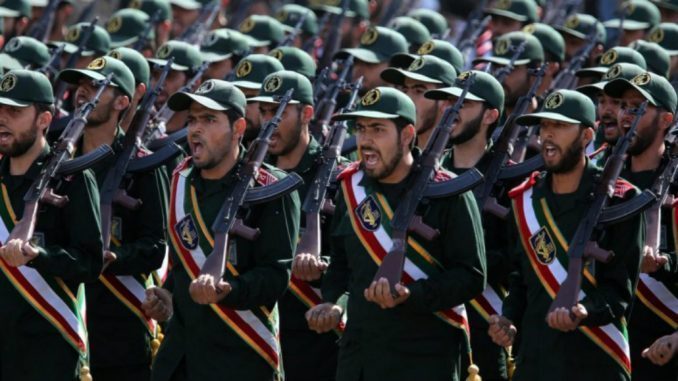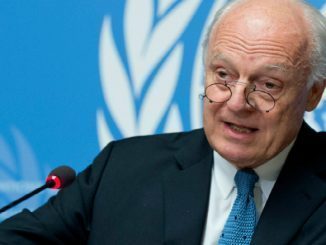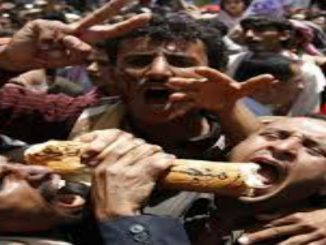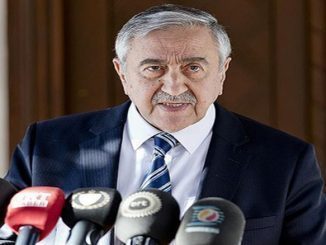
Trump’s administration was studying a proposal to designate Iran’s powerful Islamic Revolutionary Guard Corps (IRGC) as a terrorist organization, while senior defense and intelligence officials expressed their concerns about such a decision that will complicate the relation with Iran even more.
Iran’s Revolutionary Guard is an elite military unit and reports directly to Supreme Leader Ayatollah Ali Khamenei. It was established right after the 1979 Islamic revolution in Iran and has grown to dominate Iran’s economy, according to The Journal. More than 100,000 field the army, navy and air force.
The IRGC is by far Iran’s most powerful security entity, which also has control over large stakes in Iran’s economy and huge influence in its political system.
Some of Trump’s more hawkish advisors in the White House have been urging him to increase sanctions on Iran since his administration began to take shape. After tightening sanctions against Iran last week in response to a ballistic missile test, White House officials said the measures were an “initial” step.
several U.S. government agencies have been consulted about such a proposal, which if implemented would add to measures the United States has already imposed on individuals and entities linked to the IRGC.
The proposal could come in the form of an executive order directing the State Department to consider designating the IRGC as a terrorist group. It is unclear whether Trump would sign such an order.
U.S. Gulf allies have long favored a tougher U.S. stance against Iran, whom they blame for regional interference.
Reuters reported last week that the IRGC designation is among the proposals being considered as part of an Iran policy review in the Trump administration. The objective would be to dissuade foreign investment in Iran’s economy, because of the IRGC’s involvement in major sectors including transportation and oil. In many cases, that involvement is hidden behind layers of opaque ownership.
“The new administration regards Iran as the clearest danger to U.S. interests, and they’ve been looking for ways to turn up the heat,” said a senior U.S. official who has been involved in what he called a broad review of Iran policy.
US senior officials express concerns
Senior defense and intelligence officials have expressed concerns about the proposal.
A designation of the entire IRGC as a terrorist group would potentially have much broader implications, including for the 2015 nuclear deal negotiated between Iran and the United States and other major world powers.
It could also strengthen the hardliners and undercut more moderate leaders such as Iranian President Hassan Rouhani, and encourage Iranian-backed forces in Iraq and Syria to curtail any action against Islamic State in Syria and Iraq and perhaps even sponsor actions against U.S.-backed or even American forces battling Islamic State in Iraq.
The Revolutionary Guard, including its Quds Force, the elite international operations wing, and a number of Guard-affiliated companies and individuals, were placed on a sanctions list by the Treasury Department in 2007 for terrorist activities and support. The proposed Foreign Terrorist Organization designation by the State Department, however, would have far broader impact on the ability of Iranians to travel and access the international financial system.
Although the Obama administration considered taking such action, it ultimately decided it was “not useful,” according to a former senior national security official
The designation also prohibits any “material support” or other kinds of contact with the sanctioned entity, an issue that arose in Obama’s ear.
Although there is no love lost between the Defense Department and the Revolutionary Guard, defense officials worry the designation could affect indirect contacts the U.S. military maintains with Quds Force-organized- and maintained Shiite militias in Iraq.
In addition, a new move against the Revolutionary Guard would also likely buttress the position of internal Iranian hard-liners against President Hassan Rouhani, whose government negotiated the 2015 Iran nuclear deal with the United States and other world powers.
Preserving Rouhani, with a presidential election due in May, is unlikely to be a priority for the Trump administration, however, which has called the agreement a “bad deal” that has encouraged Iran’s malign behavior in other areas, but Trump should know that Rouhani’s lose will bring him a bitter enemy, the hardliners.



